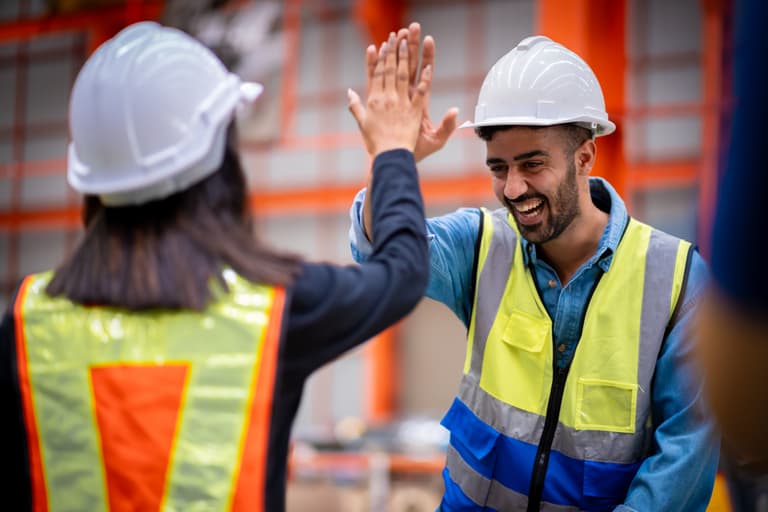Women in Construction: Challenges, Solutions, and the Path Forward


Main Takeaways
-
Women in construction are not only severely underrepresented, they also encounter significant obstacles, including harassment, discrimination, and bias, which hinder their career advancement and contribute to a hostile work environment.
-
The lack of properly fitting safety equipment and inadequate facilities on job sites pose unique challenges, while misconceptions about women's physical capabilities further discourage their participation in the industry.
-
Long hours and inflexible schedules create difficulties for women managing family responsibilities, compounded by a lack of supportive policies like flexible work arrangements and childcare support.
-
Industry-wide solutions are essential, including implementing zero-tolerance harassment policies, promoting diversity initiatives, and improving recruitment and retention strategies to attract and support women.
-
Women can overcome challenges by building support networks, developing assertiveness and self-advocacy skills, and engaging in continuous skill development and education to enhance their careers in the industry.
The construction industry has traditionally been male-dominated, but women are increasingly breaking barriers and making their mark. Despite this progress, they remain underrepresented, comprising only 10.8% of the overall workforce and about 4% in construction trades [BLS]. This disparity underscores the ongoing challenges and the need for true gender parity in the field.
Addressing these challenges and promoting diversity is essential not only for equality but also for business success. A diverse workforce brings fresh perspectives and innovative problem-solving skills, which are critical in an industry facing labor shortages and a demand for innovation. Research shows that companies with diverse teams often outperform their competitors, highlighting the benefits of inclusivity.
However, women in construction encounter significant obstacles, including harassment, discrimination, and structural barriers that hinder their advancement. These issues affect not only individual careers but also the industry's ability to attract and retain talented women.
In this article, we will take a closer look at the unique challenges that women encounter in the construction industry and discuss practical strategies for overcoming these obstacles. By addressing these issues both at the individual level and through broader industry initiatives, we can work together to create a more equitable and successful construction environment for everyone involved.
Harassment, Discrimination, and Bias in the Construction Industry
The construction industry faces significant challenges related to harassment, discrimination, and bias against female construction workers, impacting their careers and the industry overall.
Harassment can take various forms, including sexual, verbal, and physical. Women often report unwanted sexual advances, inappropriate comments, and even physical intimidation. Alarmingly, 66% of women in construction report experiencing gender harassment, creating a hostile work environment that can lead to stress and job dissatisfaction. Many women also fear retaliation if they report these incidents, which further compounds the problem and allows harmful behavior to persist unchecked.
Discrimination and bias further exacerbate these issues. Gender stereotypes often result in women being passed over for challenging assignments while hiring and promotion practices can be unequal. The pay gap in the industry is another concern, with women earning, on average, 72 cents for every dollar earned by men.
Physical Challenges and Safety Concerns
Women in construction face unique physical challenges and safety concerns that often stem from an industry historically designed for men. One of the most pressing issues is the lack of properly fitting safety equipment. Personal protective equipment (PPE) such as harnesses, gloves, and work boots are frequently sized for male body types, leaving women with ill-fitting gear that can compromise their safety and comfort on job sites.
Inadequate facilities on construction sites pose another significant challenge. Many job sites lack separate restrooms or changing areas for women, creating uncomfortable and potentially unsafe situations. This lack of basic amenities can make women feel unwelcome and can even lead to health issues if they avoid using facilities altogether.
The physical demands of construction work are often cited as a barrier for women, but this is largely based on misconceptions about women's capabilities. While some tasks in construction require significant physical strength, many roles rely more on skill, technique, and the proper use of tools and machinery. The assumption that women can't handle the physical aspects of construction work not only discourages women from entering the field but also leads to unfair treatment of those already in it. There is a critical need for better facilities and safety measures for female construction workers to ensure their well-being and encourage more women to join the industry.
Work-Life Balance Struggles
Women often face significant work-life balance challenges that can hinder their career advancement and overall job satisfaction. The increasing presence of women working in the construction industry highlights specific work-life balance challenges they face, particularly in managing both career and family obligations. The construction industry is notorious for long hours and inflexible schedules, which can make it difficult for women to manage both their professional and personal responsibilities.
For those with family obligations, such as childcare or eldercare, the demands of construction work can be particularly overwhelming. The unpredictable nature of project timelines and the expectation to work overtime can create conflicts with family commitments, leading to added stress and potential burnout.
Additionally, many construction companies lack supportive policies that could help alleviate these struggles. Options such as flexible work arrangements, parental leave, and childcare support are often limited or nonexistent, making it harder for women to balance their roles at work and home.
Industry-wide Strategies and Solutions
To create lasting change and foster a more inclusive environment for women in construction, industry-wide solutions are essential. Businesses play a crucial role in implementing these strategies and solutions, working together to support women in construction. These solutions require commitment from companies, industry associations, and policymakers.
Implementing Zero-Tolerance Policies for Harassment
Construction companies must establish and strictly enforce zero-tolerance policies for harassment
- Develop clear, comprehensive policies that define and prohibit all forms of harassment
- Implement easy-to-use, confidential reporting systems
- Provide regular training on harassment prevention for all employees
- Ensure swift, fair investigations and appropriate consequences for policy violations
- Create a culture where bystander intervention is encouraged and supported
Did you know?
In 2024, the EEOC released key recommendations for industry leaders to combat harassment in construction. The EEOC task force identified five core principles that have generally proven effective in preventing and addressing harassment:
- Committed and engaged leadership;
- Consistent and demonstrated accountability;
- Strong and comprehensive harassment policies;
- Trusted and accessible complaint procedures; and
- Regular, interactive training tailored to the audience and the organization.
Promoting Diversity and Inclusion Initiatives
The industry should actively promote diversity and inclusion through various initiatives:
- Set measurable diversity goals and track progress regularly
- Implement unconscious bias training for all employees, especially those in leadership positions
- Create employee resource groups to support underrepresented groups
- Celebrate and publicize the achievements of women
- Partner with schools and organizations to promote construction careers to young women
Improving Recruitment and Retention Strategies for Women
To attract and retain more women, construction companies should:
- Develop targeted recruitment campaigns that highlight opportunities for women to join the construction industry
- Offer competitive benefits packages, including parental leave and flexible work arrangements
- Create clear career progression paths and provide leadership development opportunities
- Implement mentorship and sponsorship programs specifically for women
- Conduct regular pay equity audits and address any gender-based disparities
- Improve job site conditions, including providing appropriate facilities and properly fitting PPE
EasyLlama: Building Inclusive Workplaces in Construction
EasyLlama offers a cutting-edge compliance training solution tailored for the construction industry. Our engaging, relatable courses help companies foster a more inclusive and positive work environment for all employees, regardless of gender.
By providing:
- Construction-specific scenarios and examples
- Mobile-friendly, self-paced learning
- Multilingual options for diverse workforces
- Automatic reminders and tracking
EasyLlama empowers construction companies to create safer, more respectful job sites where everyone can thrive. Invest in your team's growth and your company's future with EasyLlama's innovative training platform.
Overcoming Challenges: Strategies for Women
Women in construction can employ several strategies to navigate and overcome industry challenges:
Building Support Networks and Mentorship
- Joining professional organizations for women to build a sense of community
- Participating in industry events and conferences to connect with peers
- Seeking out mentors who can provide guidance and support
- Creating or joining women's groups within their companies
Developing Assertiveness and Self-Advocacy Skills
- Practice speaking up in meetings and sharing ideas confidently
- Learn to negotiate effectively for promotions, pay raises, and project assignments
- Set clear boundaries and address inappropriate behavior directly
- Document achievements and contributions to support career advancement discussions
Continuous Skill Development and Education
- Pursue relevant certifications and advanced degrees, especially for women working in the construction industry
- Attend workshops and training sessions to stay current with industry trends
- Develop both technical and soft skills, including leadership and communication
- Seek out challenging assignments to broaden experience and showcase capabilities
Building a More Inclusive Future
The construction industry faces significant challenges in achieving gender equality, but the path forward is clear. Women in construction continue to face harassment, discrimination, bias, physical challenges, and work-life balance struggles. However, by implementing comprehensive strategies—from zero-tolerance harassment policies to inclusive recruitment practices—the industry can create a more equitable and welcoming environment for women.
The benefits of increasing diversity in construction are undeniable. Women bring fresh perspectives, innovative problem-solving skills, and help address the industry's labor shortage. To realize these benefits, a collective effort is needed from companies, industry associations, and individual professionals.
We call on industry leaders to take immediate action: implement the recommended policies, invest in diversity initiatives, and actively work to change the culture of construction. For women already in the field or considering a construction career, we encourage you to seek out support networks, advocate for yourself, and continue developing your skills.
By working together and fostering a strong community, we can build a more inclusive, diverse, and ultimately more successful construction industry for all.
Resources for Women in Construction
The following resources provide valuable support, education, and assistance for women navigating careers in construction. Whether you're seeking professional development, financial support for education, or legal guidance, these organizations can help you build a successful career in the construction industry.
Organizations and Support Groups
- National Association of Women in Construction (NAWIC)
- Professional Women in Construction (PWC)
- Women Construction Owners & Executives (WCOE)
- Women in Construction Operations (WiOPS)
- NAWIC Education Foundation Scholarships
- Apprenticeship programs through local unions
Legal Resources for Addressing Discrimination and Harassment
- Equal Employment Opportunity Commission (EEOC)
- National Women's Law Center
- American Bar Association's Commission on Women in the Profession
- Local legal aid organizations specializing in employment law
Frequently Asked Questions
- How many women construction workers are there?
Women are severely underrepresented in the construction industry and make up only about 10.8% of the overall workforce and about 4% in construction trades.
- What are the main challenges women face in the construction industry?
Women encounter several challenges, including harassment, discrimination, and bias, which can negatively impact their careers. They also face physical challenges related to ill-fitting safety equipment, inadequate facilities, and work-life balance struggles due to long hours and inflexible schedules.
- How can construction companies promote diversity and inclusion?
Construction companies can promote diversity and inclusion by implementing zero-tolerance policies for harassment, providing comprehensive harassment prevention training, creating employee resource groups, and establishing clear career progression paths for women. Additionally, companies can develop targeted recruitment campaigns to attract more women into the industry.
- What strategies can women use to overcome challenges in construction?
Women can overcome challenges in construction by building support networks and seeking mentorship, developing assertiveness and self-advocacy skills, and engaging in continuous skill development and education. Networking is crucial for personal and professional growth, as it fosters collaboration and support among peers. Joining professional organizations and participating in industry events can also provide valuable connections and resources.
- Why is it important to have more women in construction?
Increasing the number of women is essential for achieving gender equality and fostering a diverse workforce in the construction industry. Diverse teams bring fresh perspectives and innovative problem-solving skills, which are critical for addressing labor shortages and enhancing overall industry performance.
- What resources are available for women pursuing careers in construction?
Women can access various resources, including organizations like the National Association of Women in Construction (NAWIC) and Professional Women in Construction (PWC), training programs and scholarships, and legal resources for addressing discrimination and harassment.




